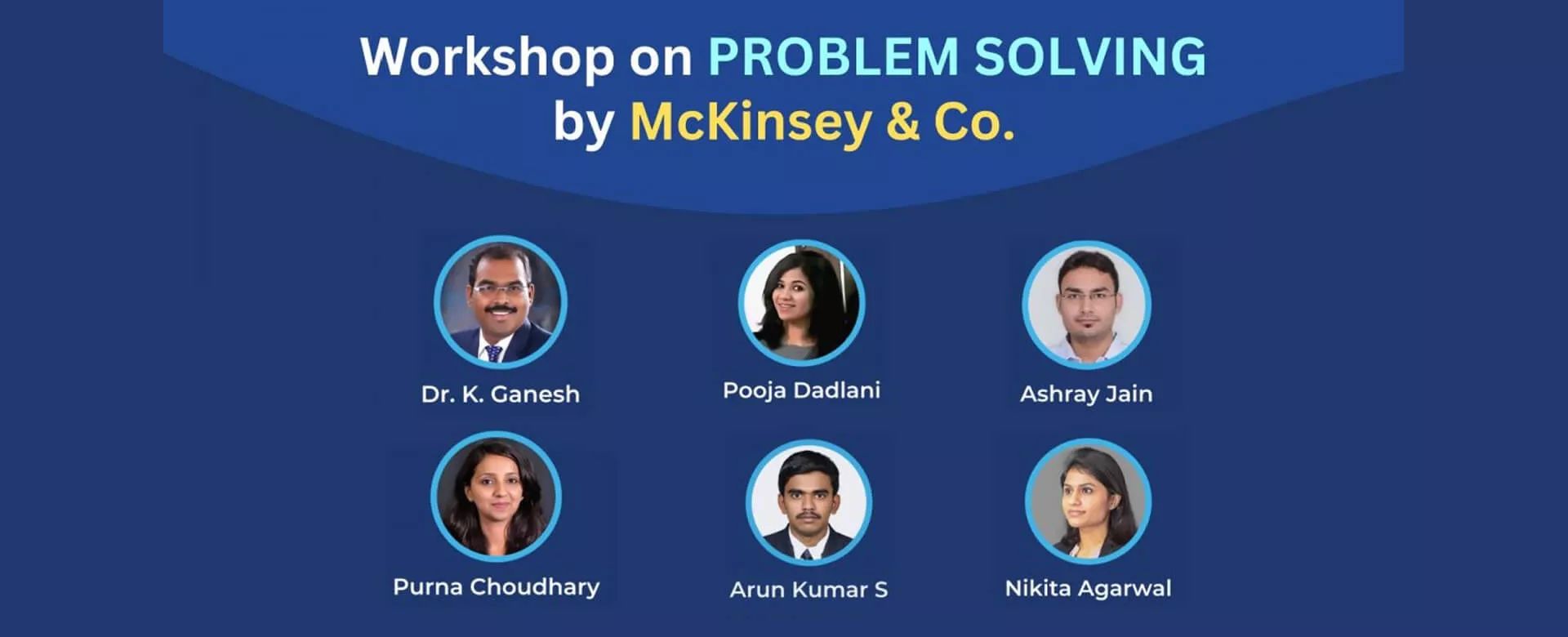Problem-Solving Workshop by McKinsey & Co. India
Last updated on: 22nd July, 2025 | Distinguished Guest Sessions | Uday Purkar, Class of 2023 << back to blog

Published on: 15th February, 2023
McKinsey & Company, a global management consulting firm, conducted a problem-solving workshop for the students of the Great Lakes Institute of Management, Gurgaon. The objective of the session was to establish and understand McKinsey’s way of problem-solving through an interactive case study session.
Introducing the McKinsey Team
The workshop was conducted by a team of six employees from McKinsey & Co. The team articulated their industrial views on problem-solving methods through their industrial experience. They also shared key insights on the topic by delivering interactive case study sessions.
The McKinsey team included –
- Dr. K Ganesh – Associate Partner, Senior Knowledge Expert, and Global Lead, Manufacturing and Supply Chain (MSC) Centre of Competence
- Pooja Dadlani – Solution Leader and Expert Consultant in Operations
- Nikita Agarwal – Expert Engagement Manager with the Service Operations Practice
- Purna Chaudhary – Specialist, Service Operations
- Ashray Jain – Product Development Expert
- Arun Kumar S – Product Development Specialist
Workshop Highlights
Initiating the session, Dr. K Ganesh mentioned the importance of problem-solving and how structured problem-solving is important in the consulting world. He highlighted how McKinsey’s way of problem-solving helps to break down complex decisions into smaller problems. He talked about how these tools can be used for effective decision-making.
Following up, Ms. Pooja and Ms. Purna explained the seven-step problem-solving approach in detail. They presented a clip from the movie ‘Money Ball’ to explain what a problem means. They also emphasized how important it is to understand the problem before hustling toward the solution. They highlighted how structured, creative, and fact-based problem-solving approaches are effective ways for decision-making.
They also presented the common problem-solving method which included methods like Hypothesis Led, Domain IP led, Advanced Analytics, Design Thinking, and Engineering. They presented a deep explanation of the hypothesis that led to seven steps of problem-solving.
7 Steps for McKinsey’s Way of Problem-Solving
- Define the problem (Problem definition)
- Break the problem into issues (Structuring)
- Conduct Analysis and identify the solution (Prioritizing)
- Eliminate all non-key issues (Issue analysis)
- Pull together finding and build segments (Analysis)
- Create Execute plan (Synthesis)
- Providing Recommendations
The speakers then provided deep insights into mentioned steps. They explained how to ask SMART to understand the problem, how to use the MECE approach to structure the problem, how to use issue analysis using the 80/20 rule to eliminate the non-essential issue, how to prioritize key attributes by using Priority Matrix, how the synthesis is different from summary and how to build idea pyramid to provide an effective recommendation.
After explaining the seven steps the speakers discussed a live case study on the service operation and explained how effectively one can use these steps to solve a problem effectively.
In the end, Mr. Ashray and Mr. Arun discussed the case on Product Development and kept forward expert insight on how they solve problems using these steps. They discussed four important lenses in product development which include Customer Insight, Design Insight, Modularity, and Platform and supply insight over which the product development problem is seen. They also explained how competitive benchmarking is done, and how data is collected and visualized through the different tools to solve the problem.
To summarise, the workshop was indeed very engaging. The audience was thrilled to see problem-solving approaches through a unique industrial perspective, live case studies, and an interactive Q&A session.
–Uday Purkar, PGPM 2023